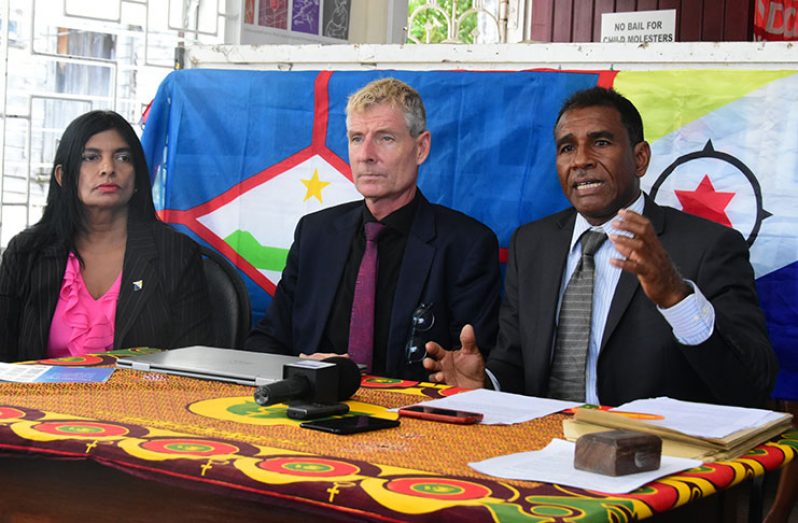–to fight human rights violations
REPRESENTATIVES from two islands of the Dutch Antilles have travelled to Guyana with a single agenda of drawing attention to situations they refer to as “violations against human rights” occurring on their islands.
Liaising with Red Thread – Guyana for the hosting of a press briefing on Monday were, three individuals from Sint Eustatius which is located in the Lesser Antilles and Bonaire which lies in the southern Caribbean.
The representatives are: President of the We Dare to Care Foundation, Davika Bissessar; Representative of the Brighter Path Foundation, Koert Kerrhoff and President of Nos Ke Boneiru Bek (We Want Bonaire Back) Foundation, James Finies.
The individuals say that since the dissolving of the Netherlands Antilles on October 10, 2010 after which they became autonomous special municipalities of the Netherlands, life has been challenging.
After the dissolution, the Dutch government assumed the task of public administration of the two countries, an action which the representatives claim was “forced”.
In a statement to the media, they told that since this change there has been a high influx of European Dutch from the Netherlands which significantly limits the job, healthcare and education opportunities for locals.
“In Bonaire, the immigration has come to such a level that it makes the local people fear for genocide by substitution. The same trend is visible in Sint Eustatius.
“These Dutch immigrants could soon outnumber locals in the electorate and replace them in the representative bodies, making the exclusion of local people complete,” Kerrhoff said.
In addition, they say the education system has been Europeanised following a language change from Papiamento to Dutch and disadvantaging local students; tax pressures are as high as in Europe with an average lower income and the crude death rate has sky rocketed.
Operating on advice received, the groups have taken their concerns to their closest neighbour, the CARICOM member states, and are hoping that the body will condemn the state of affairs on the islands at the United Nation (UN) General Assembly.
“The people of Bonaire and Sint Eustatius reach out to their brothers and sisters in the Caribbean to increase the awareness about the persistent colonial behaviour of the Dutch government towards the islands and help them in their struggle to acquire their measure of self-governance as is stipulated in the resolutions of the United Nations,” Kerrhoff said.
For five years the groups have been working towards the goal and visited islands in the eastern Caribbean and the UN in 2016 and 2017 where they met with the Ambassadors of Caribbean states such as St. Kitts, Grenada, Dominica and St. Lucia.
This year, they raised funds to travel to Guyana because it is the location of the headquarters of CARICOM and they were advised that the body can assist the two islands.
In Guyana, the representatives
profess to have spoken with Minister of Foreign Affairs Carl Greenidge, as well as Assistant Secretary General of Foreign Affairs and Community Relations at CARICOM Secretariat, Collin Granderson.
“CARICOM stands for all those things that have been taken away from us…they’re not going to be intervening but they have the possibility to guide a just process of de-colonisation…they [can] help to disseminate our information in CARICOM,” Finies explained.
It is the goal of the representatives and those who support their cause to have their human rights respected and to be re-enlisted on the list of non-self-governing countries and territories of the United Nations.
Finies says this is important because the counties’ “democratic voice has been silenced” and the local government have been accused of “corruption, nepotism and fraud” which so far they claim is without proof.
Pleading to the media he said: “We do not have a long time to fight this fight…we cannot stop any law, we cannot vote them out of office, we can do nothing.”
The group will now move on the Suriname on Tuesday (today), as they continue their search for solidarity within the Caribbean.













